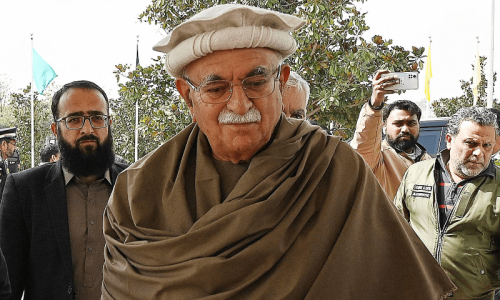‘Trade route linking Chabahar Port with Afghanistan a security threat’
ISLAMABAD: Two former defence secretaries insist the trade route which is being established by Iran, India and Afghanistan, linking Chabahar Port with Afghanistan, is a security threat.
The comments made by the former defence secretaries just a week after the agreement for the trade route was signed by Iranian, Afghan and Indian leaders, is a reflection of the opinion held in military circles, which have been deeply suspicious of the port and the trade route.
Speaking on the first day of a three-day workshop on Monday which was hosted by a local think tank, Strategic Vision Institute (SVI) on ‘National Security, Deterrence and Regional Stability in South Asia’, former defence secretary retired Lt-Gen Asif Yasin Malik said: “The alliance between India, Afghanistan and Iran is a security threat to Pakistan” and added that he feared that Pakistan is going into isolation.
“In view of the regional and global environment, I see Pakistan falling into an abyss of isolation primarily because of its own mistakes and partly due to the hostile policies of other states,” he said.
He blamed the situation on the “dysfunctional Foreign Office” and the absence of a full time foreign minister.
Iran has tried to dispel concerns about its cooperation with India and Afghanistan with its envoy in Islamabad, Mehdi Honardoost last week saying that Pakistan and China should join in on the Chabahar agreement. He had then stressed that the Gwadar and Chabahar ports should not be seen as rivals.
Pakistan’s Foreign Office also views the Chabahar port positively with Adviser on Foreign Affairs Sartaj Aziz saying at a press conference on Thursday that Pakistan did not see Iran’s Chabahar port as a rival and that Pakistan was in fact exploring the possibility of developing links with Gwadar.
Nevertheless, the concerns among the military persist as mirrored by the former defence secretaries.
At the event on Monday, retired Lt-Gen Nadeem Lodhi said the existence of such a “formidable bloc” in the neighbourhood had “ominous and far reaching implications” for Pakistan.
He feared the three-nation bloc will affect Pakistan’s plans for regional economic integration, restoration of internal peace and maintenance of peaceful borders. It will also affect CPEC timelines, he added.
“We need to break out of this encircling move with help from friends... diplomatic manoeuvres and by forging a strong deterrence,” he said, adding that of the three countries, Iran is most likely to pay heed to Pakistani concerns.
He suggested Pakistan use China’s influence for fixing problems. “Iran must not be further alienated and its interests in CPEC should be developed,” Mr Lodhi said.
He said that the defence and strategic relationship with China should be formalised instead of an unwritten understanding.
Other speakers also deliberated on national security and asked the government to broaden its conception of challenges and risks and to respond to them proactively.
Air University Registrar Ghulam Mujadid said that the eminence of security in national priorities is reflected in the four military take-overs in the country and the “ascendancy of military in political, internal and foreign policy decision making”.
“Pakistan needs to correct this strategic myopia. A survivalist mindset about national security dominates the political discourse and continues to be the central pillar in Pakistan’s strategic calculations,” he said.
Such a security focused state, he observed, allocates more resources for defence at the cost of social welfare and human security.
He pointed out that the country lacked forums for national security formulation. Recognising that the establishment of a Cabinet Committee on National Security and the appointment of a national security adviser were steps in the right direction.
Mr Mujadid noted that “decisions on security issues remain ad-hoc and disconnected; formulated and implemented in separate silos, hence policies are reactive instead of being consistent and coherent”.
Published in Dawn, May 31st, 2016














































